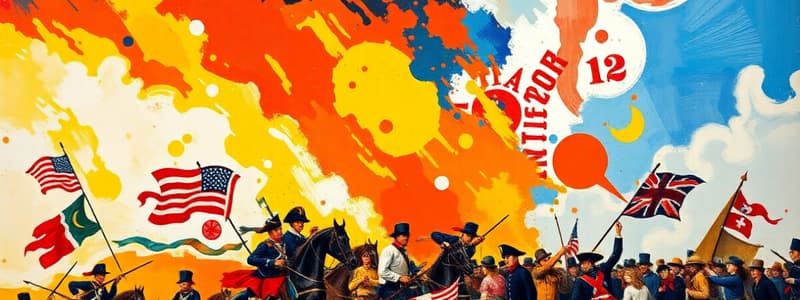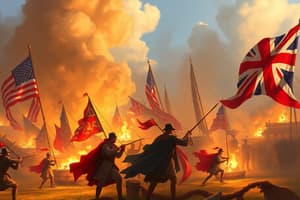Podcast
Questions and Answers
Which of these options accurately describes the events leading to the defeat of the Creek people?
Which of these options accurately describes the events leading to the defeat of the Creek people?
- Tecumseh's death in 1813 and subsequent loss of hope for a Native American confederation.
- Andrew Jackson's attack on the Creeks in March 1814.
- The Battle of Horseshoe Bend in August 1814.
- All of the above. (correct)
- None of the above.
The British forces were able to focus more troops on the American conflict after Napoleon's defeat.
The British forces were able to focus more troops on the American conflict after Napoleon's defeat.
True (A)
What was the name of the battle that significantly weakened the Creek resistance?
What was the name of the battle that significantly weakened the Creek resistance?
Battle of Horseshoe Bend
The British forces sailed into ______ Bay to attack Washington, D.C.
The British forces sailed into ______ Bay to attack Washington, D.C.
Match the following individuals with their roles in the events described:
Match the following individuals with their roles in the events described:
What was the outcome of the British attack on Washington, D.C.?
What was the outcome of the British attack on Washington, D.C.?
The Creek people were able to retain most of their lands after their resistance against the United States.
The Creek people were able to retain most of their lands after their resistance against the United States.
What event in 1813 significantly impacted the hopes of a Native American confederation?
What event in 1813 significantly impacted the hopes of a Native American confederation?
What was the primary strategy of the British officer mentioned in the text?
What was the primary strategy of the British officer mentioned in the text?
The United States was well-prepared for the War of 1812.
The United States was well-prepared for the War of 1812.
The British officer's actions were aimed at harming the American ______ during the War of 1812.
The British officer's actions were aimed at harming the American ______ during the War of 1812.
Match the following geographical features with their corresponding locations on the map:
Match the following geographical features with their corresponding locations on the map:
What is the name of the war that the text discusses?
What is the name of the war that the text discusses?
The British officer mentioned in the text was successful in carrying out his plan to damage American infrastructure and government resources.
The British officer mentioned in the text was successful in carrying out his plan to damage American infrastructure and government resources.
Who commanded the Lake Erie naval forces?
Who commanded the Lake Erie naval forces?
The Americans successfully conquered Canada by the end of 1813.
The Americans successfully conquered Canada by the end of 1813.
What nickname was given to the USS Constitution during its battles?
What nickname was given to the USS Constitution during its battles?
The battle on Lake Erie took place on __________ 10, 1813.
The battle on Lake Erie took place on __________ 10, 1813.
Match the following events with their corresponding outcomes:
Match the following events with their corresponding outcomes:
The War Hawks were confident of a quick victory against the British.
The War Hawks were confident of a quick victory against the British.
Which of the following was NOT a reason for the American's unpreparedness for war?
Which of the following was NOT a reason for the American's unpreparedness for war?
The Battle of the Thames took place on ______ .
The Battle of the Thames took place on ______ .
What was the name of the Native American leader who fought alongside the British?
What was the name of the Native American leader who fought alongside the British?
Match the following military figures with their respective actions:
Match the following military figures with their respective actions:
Which countries were primarily involved in the War of 1812?
Which countries were primarily involved in the War of 1812?
Flashcards
John Bull
John Bull
A national personification of Britain.
Brother Jonathan
Brother Jonathan
A representation of the United States, often depicted as a man in a hat.
Tecumseh
Tecumseh
A Native American leader who sought to unite tribes against settlers.
Battle of Horseshoe Bend
Battle of Horseshoe Bend
Signup and view all the flashcards
Creeks
Creeks
Signup and view all the flashcards
British Offensive (1814)
British Offensive (1814)
Signup and view all the flashcards
Andrew Jackson
Andrew Jackson
Signup and view all the flashcards
Washington D.C. Attack
Washington D.C. Attack
Signup and view all the flashcards
Battle of Lake Erie
Battle of Lake Erie
Signup and view all the flashcards
Old Ironsides
Old Ironsides
Signup and view all the flashcards
Oliver Hazard Perry
Oliver Hazard Perry
Signup and view all the flashcards
Privateers
Privateers
Signup and view all the flashcards
York (Toronto)
York (Toronto)
Signup and view all the flashcards
Battle of New Orleans
Battle of New Orleans
Signup and view all the flashcards
War Hawks
War Hawks
Signup and view all the flashcards
Hull's Surrender
Hull's Surrender
Signup and view all the flashcards
Battle of the Thames
Battle of the Thames
Signup and view all the flashcards
War of 1812
War of 1812
Signup and view all the flashcards
British officer's report
British officer's report
Signup and view all the flashcards
Government connections
Government connections
Signup and view all the flashcards
Military Strategy
Military Strategy
Signup and view all the flashcards
Territorial disputes
Territorial disputes
Signup and view all the flashcards
Trade restrictions
Trade restrictions
Signup and view all the flashcards
Burning and destruction
Burning and destruction
Signup and view all the flashcards
Study Notes
War of 1812 Overview
- The War of 1812 was a conflict between the United States and Great Britain.
- Fighting took place in the U.S., Canada, and at sea.
- The war lasted from 1812 to 1815.
- The war ended with a new spirit of nationalism in the U.S.
Key Figures and Events
- June 1812: The United States declares war on Britain.
- September 1813: Oliver Hazard Perry defeats the British navy on Lake Erie.
- August 1814: The British burn Washington, D.C.
- January 1815: The Americans win the Battle of New Orleans.
Key Terms
- Frigate: A fast warship.
- Privateer: A privately owned armed ship.
- War Hawks: Members of Congress who strongly supported the war.
Causes of the War
- Disputes over trade restrictions and impressment of American sailors by the British.
- Border disputes between the U.S. and British territories.
- British support for Native American resistance against American expansion.
- The American's desire for expansion.
Early War Setbacks
- Early American military efforts were poorly planned and executed.
- The Americans underestimated British strength and their Native American allies.
- The U.S. forces suffered initial defeats, and there were concerns about preparation and strategic leadership
War Strategies
- The British focused on attacking Washington D.C. and Baltimore.
- American privateers successfully targeted British ships.
Native American Involvement
- Tecumseh, a Native American leader, allied with the British.
- Tecumseh was killed during the Battle of the Thames.
- The death of Tecumseh and other defeats severely weakened Native American confederation efforts.
The Aftermath
- The Treaty of Ghent ended the war without significant territorial changes for either side, but the treaty did address the issues that started the war.
- The war was a significant moment in American nationalism and identity.
Studying That Suits You
Use AI to generate personalized quizzes and flashcards to suit your learning preferences.




